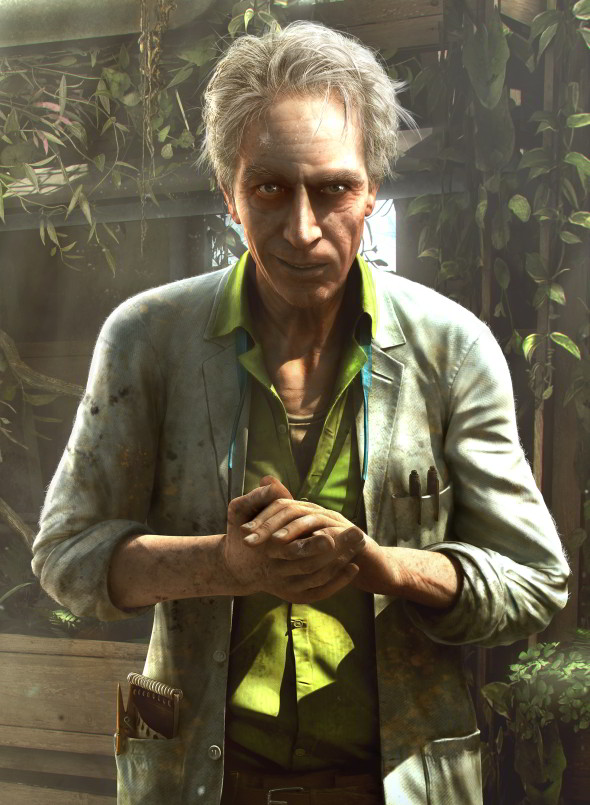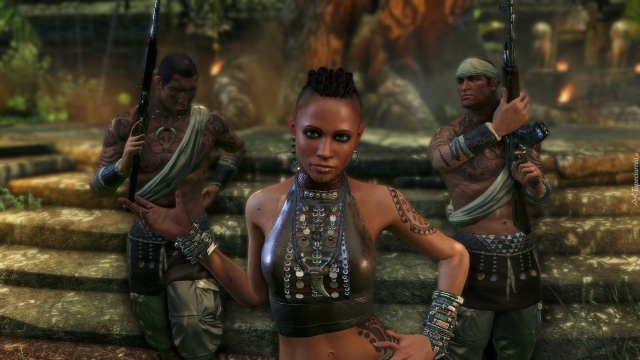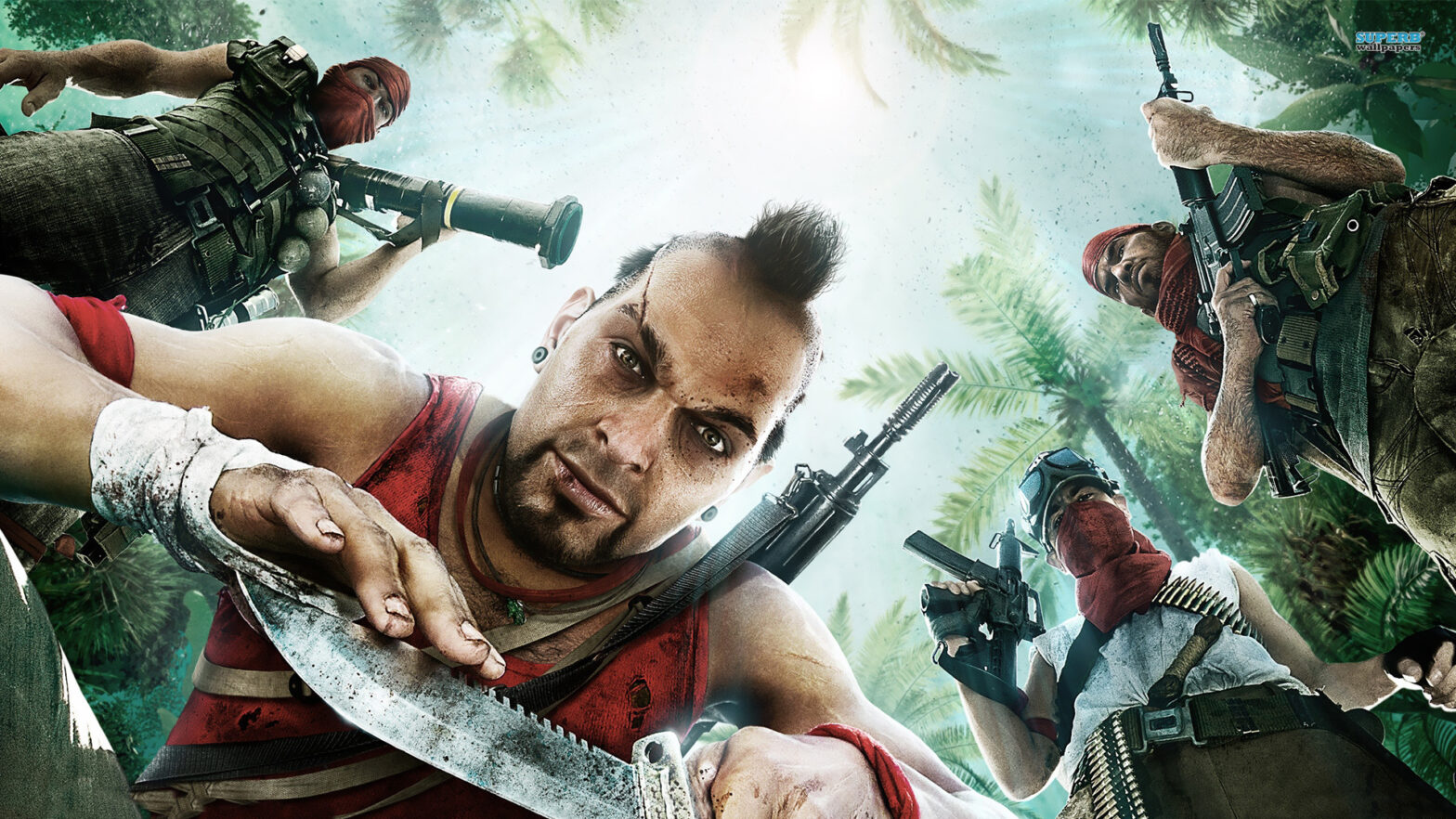**SPOILERS!** This article is a discussion of plot elements in games, meaning that it contains many **SPOILERS!**
In Far Cry 3, you play as Jason Brody, who is lured to an “island where you can do anything”, only to be immediately captured by the violent Vaas and his gang of pirates. Jason is able to escape with his brother, even though the latter is killed before they are in the clear. Jason then decides to fight Vaas and his gang in order to free his friends and his younger brother. His is aided by a number of colourful characters, one of which is the exotic Citra, who ends up competing for Jason’s love and devotion with his girlfriend Liza.
As you probably know, this is still typical ‘First-person Shooter’ (FPS) stuff. Nothing too crazy happening at this point! And at first sight, Far Cry 3 plays around with the usual tropes of the FPS genre: you start out as a rookie, but gain both power and abilities as you play, which eventually allows you to defeat the big bad boss and exact your revenge. A cynic might even call this story a cliché: there are women who desperately need your help, it turns out that there is an even bigger bad guy operating behind the scenes and the protagonist mows down entire armies as if it’s just another day at the office.
But the vigilant player will have noticed that one theme plays a central part in Far Cry 3: madness.

Shocker
The game appears to be a tour past all facets of madness, insanity and mental trauma. The madness manifests itself in characters, events and locations. Allow me to argue how Ubisoft plays with our notions and expectations of madness.
Let’s start with the easiest part, shall we? Who are mad in the game? I’m not going to discuss Jason and Vaas here; I will try to prove that they require a different approach. Let’s go over a few of the other main characters. I assume it’s obvious that Hoyt, the ultimate bad guy of the Rook Islands, is a megalomaniac. He thinks himself untouchable and overestimates his own power, most of which is acquired through money and violence. I would place Citra in the same category, although her megalomania comes from her (over)confidence in her magic and rituals.
Dennis, as a follower of Citra, is enchanted by his ‘warrior goddess’; fully obsessed and willing to do for her whatever it takes. Doctor Earnhardt, currently working as drug manufacturer, has clearly gone insane after his daughter’s death: he believes that the character of Daisy is his daughter, and addresses Daisy with his daughter’s name. CIA-agent Willis has lost it after being isolated for so long, much like the German Sam, who has also developed paranoia as a consequence of his time undercover. The case of Hurk, the explosive fanatic who tries to use monkeys as detonators, hopefully requires no further explanation.

Hurk’s is the face of a rational, sensible man
But the situations and missions are equally insane. Quite a few missions are played as Jason is hallucinating, causing the world around him to behave or be manipulated in unexpected ways. And just how many times does Jason charge an overwhelming number of enemies by himself, as if he’s a rabid dog? Or take a look at some of the locations: a burning hotel, a sinking ship and blazing drug fields. Of course, the frequent Alice in Wonderland quotes might hint in the direction of madness as well…
Rationality versus madness
Apart from these insane game elements, I discern two central dichotomies in the game, one of which forces the player to choose a side. First of all, there appears to be a polarization between Liza and Citra. Liza is a realist: she dislikes Jason’s fixation on parties and irresponsible behaviour and constructively tries to get off the island. Daisy fills a comparable role, for that matter: even after her boyfriend Grant has been murdered, she remains rational and works towards a solution by repairing an old boat. Liza represents a sober philosophy: work hard, and you will eventually harvest the fruits of your labour.
On the other end you find Citra. Rather than staying realistic, she fills Jason’s head with promises of power and victory. She seduces him with rituals and supernatural gifts. By helping her, Jason is rewarded by the chance of ruling the island with her. Citra also represents the easy path to results, since Jason isn’t required to accept any form of responsibility. All she asks of him is that he gives in to his boyish fantasies of becoming a warrior and of delivering revenge to those who wronged him. And let’s not forget: Citra rewards Jason with sex, thus satisfying his impulsive behavioural tendencies.

Who could resist a smile like that anyway?
By the end of the game, the player needs to make a decision. Will you give in to the madness, or not? Choose Liza, and Citra is unintentionally killed by Dennis – one form of madness slaying the other. You are finally able to leave the island, while Jason gives a monologue on the hardships of returning to rational society after his experiences on the Rook Islands.
However, choose Citra’s madness and you will quite literally cut the throat of rationality (read: Liza). The ending is a logical conclusion of these events. After sex with Citra, Jason is stabbed in the chest by his lover. It turns out she didn’t actually need Jason, only his offspring. As Jason (and the player) is slowly dying, you can hear Citra whisper the words: “You win.” How could the message be any clearer? Jason literally perishes if he gives in to the madness!
That’s why this is the ending instead of the duel with Vaas. You need to make a choice, based on everything you’ve experienced so far. Is it better to submit to madness and pursue its promises, or abandon that path and try to regain your former life? The player has to ask himself what his best option is. And that is why the choice matters, even if it doesn’t actually affect the game afterwards, apart from two different cut scenes. It’s because the choice function as a mirror to the player.

Could you sever the ties to your normal, rational life?
Jason = Vaas?
And finally there is the second dichotomy: Jason and Vaas. Even though Hoyt is technically Vaas’s boss, the latter is the iconic enemy of the game. He leaves the biggest impression on the player, not only by being the poster boy of the game. I feel that Jason and Vaas have a lot in common though, and I think that Jason’s victory over Vaas was only possible thanks to Jason’s flirtations with madness.
At the start of the game, Jason is controlled and civilized. Taking a life is scary, survival is hard and the social and emotional pressure from his friends in peril weighs heavy on his heart. But as you progress in the game, you will notice that Jason begins to change. He starts to embrace the madness of the islands. For one, he begins to express pleasure in killing Vaas’s and Hoyt’s men, in addition to clearly showing less despair when faced with seemingly impossible challenges. On top of that, he frequently experiences visions or dream journeys, by using stimulants. By the end of the game, Jason has descended deeply into the abyss of madness that Rook Islands represent, and his chances of returning from it are slim.
His opponent is Vaas. Okay, here is a controversial statement from my part: I don’t think Vaas is actually insane. Sure, he is violent, unpredictable, a killer and a suppressor, but he often shows a calculating, philosophical side of his personality. I believe he is a realist, or in any case a pragmatist or opportunist. He carefully contemplated the situation and environment he is in, and decided to adapt to them to survive. He starts working for Hoyt, who definitely is crazy, and is rewarded for proficiently executing insane orders. But even in situations of madness he seems in control, as is proved by setting traps for Jason throughout the game. It’s just like he himself says in his famous speech: “[I]t’s not like I am fucking crazy”.
Jason and Vaas are two sides of the same coin. In fact, they share some character traits: they both love(d) Citra and both are chasing highs. Jason seems to be an adrenaline junkie, while Vaas became a drug addict. The game frequently presents Vaas and Jason as the same person in Jason’s hallucinations, as is shown in this video (check out the part between 0:58 – 1:05 and 1:18 – 1:28):
No, I’m not going to delve deeper into Vaas and Citra switching bodies in that clip, although that’s also an interesting path to take. But this article is becoming long enough as it is.
By giving in to the madness of the islands, Jason grows stronger than Vaas. Those are the rules of the island. Jason even assumes control of his hallucinations. Vaas and Hoyt are killed as Jason is hallucinating. It should be putting him at a disadvantage, but the hallucinations actually increase Jason’s martial prowess. How else would you explain the dead bodies of Hoyt and his guards in the poker room, even though you just fought Hoyt with your knife in close combat?
To illustrate: just before you duel Vaas, Jason attempts to infiltrate Vaas’s personal stronghold all by himself. You easily dispose of the perimeter guards and sneak in. However, it immediately becomes clear that you just sprung a trap: Vaas is talking to you through television screens and says that he was expecting you. Vaas’s army assaults you from all sides, tigers are sent to kill you, and finally one of his heavily armoured guys tries to finish you off. Which one is the actual crazy guy at this point: the obviously well-prepared Vaas or Rambo-wannabe Jason?
Of course, Jason’s growing appetite for death and destruction is meant to mirror that of the player. We play the game because we too enjoy the feeling of being all-powerful. Not just powerful, but also liberated and safe: if Jason dies, we just load the last save point and as we are being shot at from multiple directions, we the players aren’t actually affected by that. Jason gains more control over himself and the island through Citra’s tattoo magic, meaning that he has less to fear from the consequences of his confrontations with the armed men of Vaas and Hoyt. He knows, just like us, that they can’t really hurt him. You can even afford to play with them a bit, by luring a tiger to an outpost, for example, or by just strolling right into a camp and start firing around you(!)
Playing with a genre
Lest I forget: Far Cry 3 is first and foremost a whole heap of fun! Yet it sees to be (self) aware of the madness that is linked to the FPS-genre. I mean, you’d have to be insane to besiege an enemy camp all by yourself, or to accept all kinds of assassination missions from strangers without asking further questions, right?
This is exactly what happens in many shooters though, without showing any irony. But Far Cry 3 even differs from a game like Just Cause, since that series has become more of a parody of the genre (much like Saints Row has become a parody of sandbox game like Grand Theft Auto). That game also contains insane situations, but does this more explicitly and doesn’t seem to take itself too seriously.
.png/revision/latest?cb=20131120194910)
Pictured: plausibility
Finally, Far Cry 3 is quite different from its predecessor. Part 2 has you play in a cynical world, in which our concept of war is examined. Far Cry 3 has noticeably different qualities: it has embraced the madness and toys with the irony of the genre. As a result, the game is not only a lot of fun to play; it also makes you stop and think.
(As I finished writing this, I realised that you could just as easily ignore all of the above and conclude that Jason never left that mushroom cave and spent the rest of the game in hallucinogenic bliss…)


0 Replies to “Far Cry 3 is insane!”